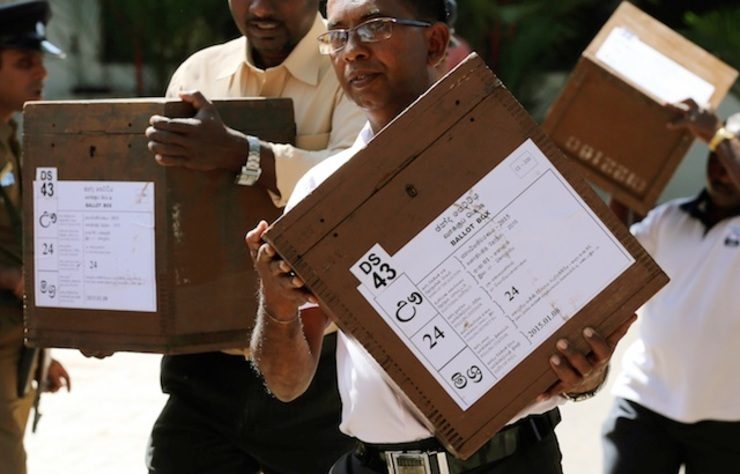SUMMARY
This is AI generated summarization, which may have errors. For context, always refer to the full article.

COLOMBO, Sri Lanka – Sri Lankans turned out in large numbers Thursday, January 8, shrugging off some reports of voter intimidation to vote in the island’s tightest election in decades as President Mahinda Rajapakse battles for survival.
Turnout was higher than expected in Tamil-dominated areas of the north and east, which have boycotted national elections in the past and where resentment against Rajapakse runs high.
Sri Lanka’s strongman leader seemed assured of victory when he called snap polls in November seeking an unprecedented third term, five years after crushing a violent separatist rebellion that had traumatized the country for decades.
But he has more recently been dogged by accusations of increasing authoritarianism and corruption and a failure to bring about national reconciliation.
Health Minister Maithripala Sirisena’s shock decision to defect from the government and stand against the president led to a bitterly fought campaign for the election, which analysts say is too close to call.
Rajapakse said he was confident of a “resounding victory” and promised a peaceful post-election period as he cast his ballot.
The president has come under international pressure, with top US diplomat John Kerry this week urging him to ensure the election was peaceful and credible.
Early indications suggested national turnout could be as high as the near 75 percent reported in 2010.
“We are seeing heightened enthusiasm among minorities,” said the head of the Campaign for Free and Fair Elections, Keerthi Thennakoon, adding that the high participation could favor the opposition.
There were no significant reports of violence, although opposition supporters accused the government of deploying troops to ethnic Tamil-dominated areas, including the northern Jaffna peninsula.
Two explosions were heard in Jaffna in what Tamil leaders said was an attempt to deter voting, but there were no casualties.
Tamil kingmakers
Tamil translator S. Sebanayagam said he had to wait in line to cast his vote in Jaffna.
“There were lots of people ahead of me, including some very elderly people who seemed keen to vote,” he told AFP.
Tamils are Sri Lanka’s largest minority, accounting for 13 percent of the population, and could decide the election if the majority Sinhalese vote is split between Rajapakse and his main opponent.
Sirisena was a relative unknown until he became the main opposition candidate, but his decision to run triggered a slew of defections and become a rallying point for disaffection with Rajapakse and his powerful family.
“My victory is in sight. There is support for us everywhere,” said Sirisena as he cast his vote, promising a “new political culture”.
Rajapakse had appeared politically invincible after his forces crushed the Tamil Tigers in 2009 and brought peace to the island.
South Asia’s longest-serving leader won a landslide election victory in 2010, but critics say he has failed to bring about reconciliation in the years that followed.
The 69-year-old president removed the two-term limit on the presidency and gave himself more powers soon after winning his second term.
He is accused of undermining the independence of the judiciary and has packed the government with relatives, sparking resentment even within his own party.
Opposition groups including the main Tamil party have rallied behind Sirisena, a 63-year-old former farmer who, like Rajapakse, is from the majority Sinhalese community.
The president has taken drastic measures to shore up support, slashing fuel prices, cutting water and electricity tariffs and giving subsidized motorcycles and hefty pay increases to 1.6 million public servants.
Hefty Chinese investment
Sri Lanka’s economy has grown by an annual average of over seven percent since the war ended, partly thanks to hefty investment from China.
But the opposition says Chinese contractors have employed few local people and household incomes have not kept pace with national growth rates.
The election comes days ahead of a visit to the island by Pope Francis that is expected to focus on reconciliation.
Sri Lanka is a mainly Buddhist country, but has sizeable Hindu, Muslim and Christian minorities.
Rajapakse has promised a judicial inquiry into allegations troops killed 40,000 Tamil civilians at the end of the civil war, although he still refuses to cooperate with a UN-mandated investigation.
The independent Centre for Monitoring Election Violence said it had documented 420 incidences of violence during the campaign, with the north worst hit.
On Wednesday, police said an opposition activist had died after being hit in a drive-by shooting at a rally for Sirisena.
Voting for the 19 candidates on the ballot closed at 4:00 pm (1130 GMT), with results expected on Friday. – Rappler.com
Add a comment
How does this make you feel?





There are no comments yet. Add your comment to start the conversation.